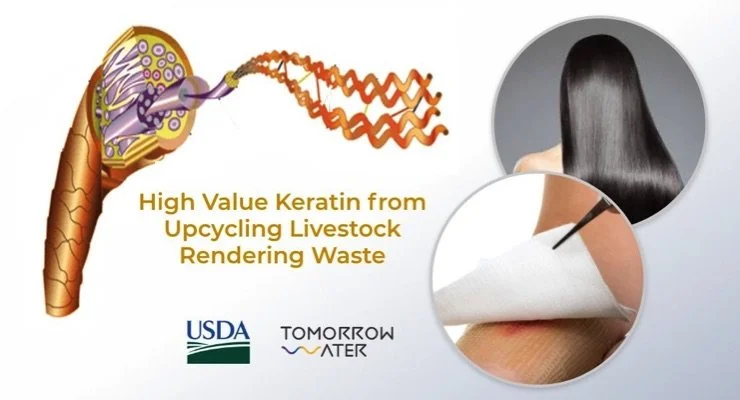USDA SBIR Grant for Upcycling Keratin from Livestock Rendering Waste
California company says its technology extracts and preserves original chemical structure.
Tomorrow Water, an Anaheim, CA-based provider water treatment technologies and eco-friendly waste management solutions, has been awarded a Small Business Innovation Research Program (SBIR) grant by the US Department of Agriculture (USDA) that will support the development of its environmentally friendly technology that extracts and upcycles keratin from discarded animal rendering waste.
The global livestock industry creates billion of tons of waste every year. While carcasses, offal and bones can be converted into useful products at rendering plants, Tomorrow Water says millions of tons of feathers, nails, hair, and wool end up in landfills. This waste, which is rich in keratin, slowly decays in landfills to produce vast amounts of methane and other greenhouse gases.
Existing technologies that extract keratin from animal waste use large amounts of chemicals such as ammonia, generating significant chemical waste. The technologies can also alter the chemical structure of the keratin, potentially affecting its usefulness, contends the company.
Tomorrow Water's Draco thermal hydrolysis technology extracts keratin from animal rendering waste without the use of what the compay calls "caustic or environmentally damaging" chemicals. Once liberated and solubilized by Draco, the company says the keratin can be efficiently purified using FMX, its special ultrafiltration system separates the keratin from the Draco-treated animal waste slurry. Notably, the Draco process preserves keratin's original chemical structure as much as possible, which is important for downstream uses in pharmaceutical products and high-end cosmetics.
The first $100,000 SBIR grant awarded to Tomorrow Water by the USDA will fund Phase I development of the Draco-FMX technology, in which the company will refine and optimize the process before scale-up begins. After Phase I, Tomorrow Water will apply for Phase II SBIR funding, which would provide more than $600,000 for prototype scale-up and field demonstration work.
"This provides a truly eco-friendly and cost-efficient solution to convert a significant waste stream – animal rendering waste – into a substantial profit stream," said Dr. Ken Tasaki, VP of business development for Tomorrow Water.
"Make no mistake – keratin is valuable, with some estimates placing it easily over $1,700 USD per kilogram depending on the final end product,” he continued. “I am very proud of our team for what they have accomplished with this technology, which has been in the works for over four years. Now it's time to accelerate its development and get it out into the world.”


